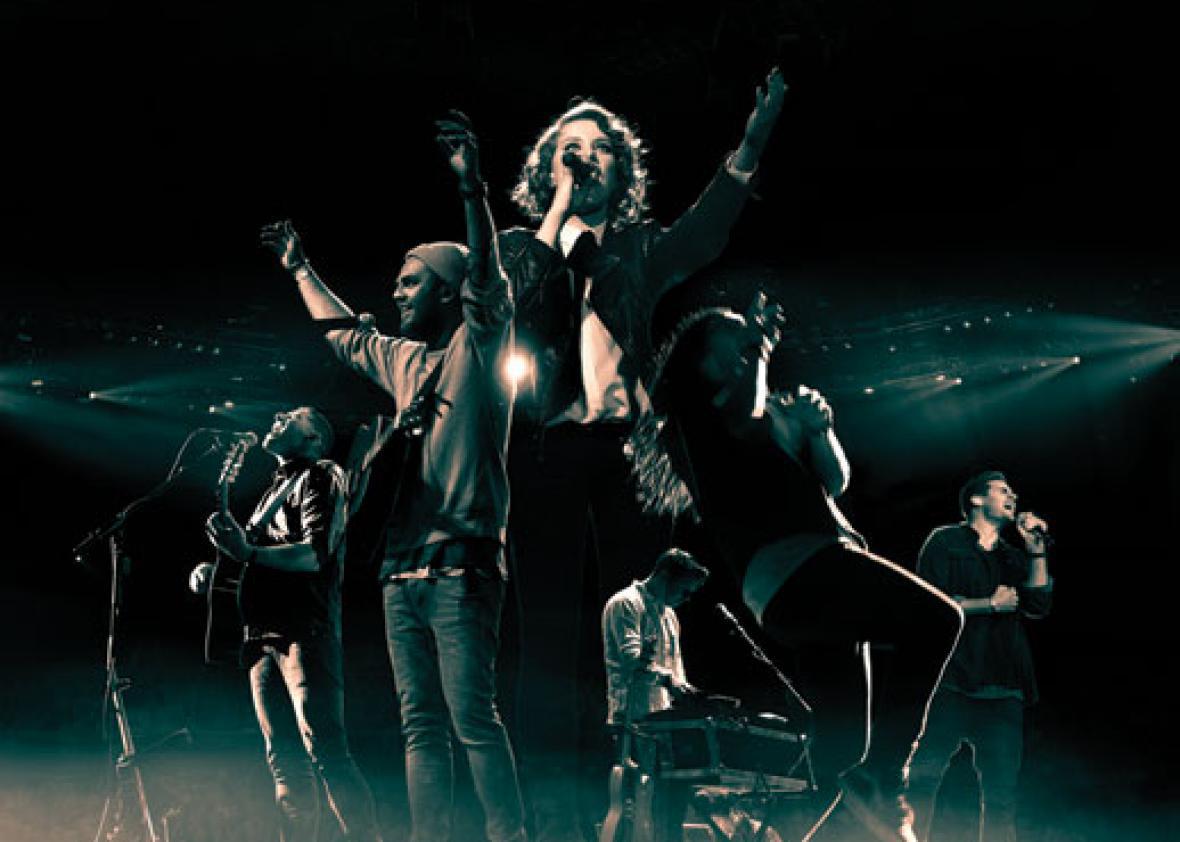Not many bands as successful as Hillsong United require introductions. The group performs in packed arenas all over the world, and its albums debut near the top of Billboard charts. “We’re the biggest band you’ve never heard of,” singer Jad Gillies says early on in Hillsong: Let Hope Rise, a slick new concert film that gives Hillsong the same flattering big-screen treatment that Katy Perry and One Direction have received in recent years.
Hillsong United is a Christian worship band, which means it plays music for listeners to sing along to as a form of spiritual devotion. That’s what Let Hope Rise attempts, too. “This film is intended as a theatrical worship experience,” reads a message on screen as the movie begins. “The filmmakers welcome your participation.” During musical performances, the lyrics are projected karaoke-style to encourage theater crowds to sing along. “These songs are written for people to sing, not just to listen to,” band leader Joel Houston tells the camera at one point.
Like Coldplay and U2, Hillsong United writes soaring melodies that work as extremely efficient emotion-producing machines. Singer Taya Smith’s live performance of the band’s most popular song, the soaring ballad “Oceans (Where Feet May Fall),” is the chill-inducing show-stopper in Let Hope Rise. I saw the movie at noon on a weekday in the least religious state in America; the only other person in the theater seemed to have wandered in by accident. This was not an ideal viewing experience for a movie meant to crack open your heart and unloose your tongue. I didn’t sing or cry or raise my hands, like the fans in the crowds on screen do. But I’ve been surreptitiously listening to the music ever since.
The plot of Let Hope Rise, such as it is, revolves around the band’s preparation for a show at the Forum, a 17,500-seat arena in Los Angeles. Hillsong United is the flashiest offshoot of an Australian megachurch called Hillsong whose several musical brands have collectively sold 20 million albums, and in many ways their concert prep is like Perry’s or One Direction’s: Write new songs, rehearse, sound-check. But Hillsong also has to run its new lyrics past a panel of pastors who check them for theological integrity, and they make time for prayer, too.
In a sharp and touching GQ profile of the Hillsong empire last year, Taffy Brodesser-Akner described one of the church’s house bands as “a unisex band of Christian genetic marvels … buoyant and shiny with salvation.” Sexy and stylish as they are, Let Hope Rise often makes band members look more like choirboys than rock stars. Singer Jonathan Douglass (“JD”) lives with his in-laws in Sydney, because he and his wife, a stay-at-home mother, haven’t saved up enough to buy their own place. “It’s not worth it for what we’re being paid, but it’s worth it for what we’re doing,” Gillies says. (The financials of this blockbuster musical group are somewhat mysterious.) Director Michael John Warren, who previously directed Jay Z’s Fade to Black, also shoots the band visiting children in a slum in the Philippines while on tour.
Warren casts the band’s leader, Houston, as a brooding, devout songwriter, intensely focused on the theological and emotional power of his work. The movie never shows his wife, a Brazilian model, or his close personal friend Justin Bieber. As far as I noticed, it doesn’t even mention that Houston, the son of the church’s founding pastor, is a leader in the New York branch of the church. Let Hope Rise doesn’t ask what it means that the members of Hillsong United are superfashionable and fit, or how the psychology of emotion-generating music actually works, or what kind of Christianity Hillsong is promoting. This documentary is not here to ask questions. It’s an advertisement for the way Jesus can make you feel. And in the dark, with surround sound blasting, if you’re remotely susceptible to such feelings, it’s quite good at that.
“There is no other name,” the band belts out during one musical sequence that seemed almost capable of lifting the enraptured audience onscreen several inches off the ground. “There is no other name, Jesus Christ our God.” Houston collapses onto his knees as the other vocalists finish the song. He seems to be praying, lost in an intense personal moment on stage in front of thousands of people. His back is to the crowd. But he’s facing the camera.
